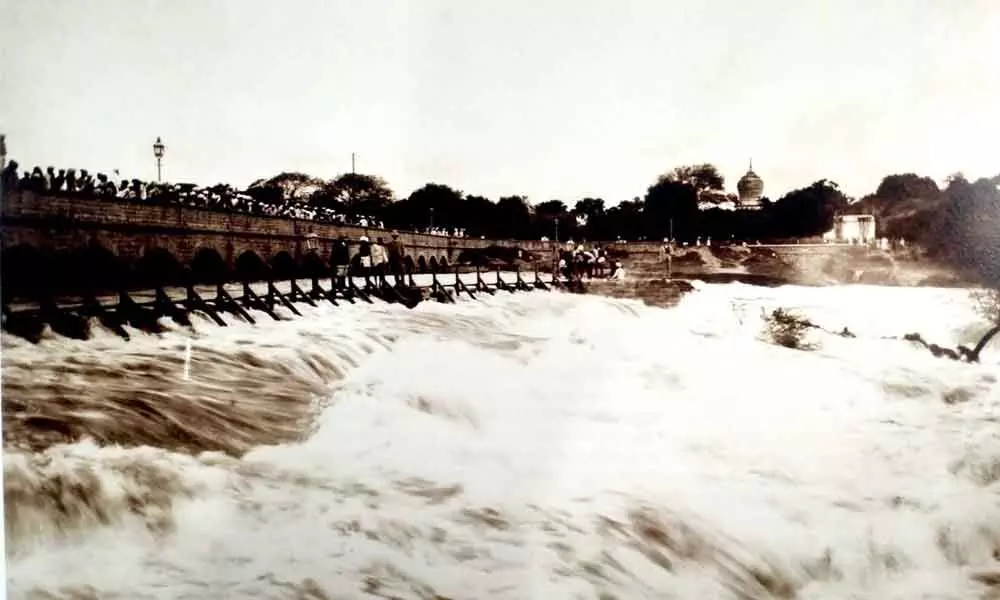The day Musi turned belligerent

The day Musi turned belligerent
Even as heavy downpours have been battering the State capital to the most, inundating city roads, sucking lives through manholes and open nalas and changing streets into furious waterways, one wonders if the history has its curious way of repeating itself after a century.
The Nizam was utterly devastated by this catastrophe, for he could not see his people and his city drowned, not just in the waters of the Musi but also the sea of sorrow. He was restless and feverish, receiving almost minute by minute reports and issuing relief orders. Though his motor car refused to move in the water, he did not. He would either go his horse or just on foot among the suffering people. Whole families were buried beneath the houses they had built themselves and those who managed to save their lives had to witness the plight-searching for the bodies for their loved ones, calling their names and wandering helplessly. Mahbub Ali Pasha went about comforting people, inspiring them to be strong and help others wherever they could. He opened his palaces around the city, giving refuge to all the homeless people and a number of kitchens worked round-the-clock from September 29 to October 13 to feed them. He opened public shelters, distributed clothes and shawls, and personally donated a million rupees for the relief fund
Even as heavy downpours have been battering the State capital to the most, inundating city roads, sucking lives through manholes and open nalas and changing streets into furious waterways, one wonders if the history has its curious way of repeating itself after a century.
Sitting next to my window and just staring at the perpetual rain outside, I look at the beautiful Musi which gently flows at a distance. Realising it is September, I ask myself, "What if history repeats itself?" only to feel a wave of mixed emotions that make me go 112 years back in time. To revisit the unanticipated guest that Hyderabad then welcomed, who continues to haunt the city and the memories of its people till date.
Exactly 112 years ago, Hyderabad was drowned in extreme happiness and prosperity by its 'beloved', the sixth Nizam Mahbub Ali Pasha for his rule was filled with joy and celebrations. However, little did she realise that something scarier was making its way that would literally drown her and leave pain for a lifetime. On Saturday, September 26th 1908, heavy rains covered the city which made their way due to a cyclonic storm in the Bay of Bengal. A ceaseless downpour continued for 48 hours, which resulted in the rise of water level in Musi to 20 feet. By Sunday evening, the water started reaching the doorsteps of the houses near the bank and it had soon become a cloudburst. The Musi rose unprecedentedly, breaking all its wooden barriers, washing away everything that came its way. Water headed up behind Purana Pul and breached the city wall about 3 o'clock by the morning of September 28th, Monday. As writers H R Lynton and Mohini Rajan described the account of one of the eyewitnesses of this tragedy in their book 'The Days of the Beloved', "The water was high enough to drown an elephant in the streets. Those who had climbed on the roofs of houses and the tops of trees to save themselves were being washed away with those very houses and trees. The city walls too collapsed, carrying with them hundreds of people who had sought safety on their broad tops." Not only was the unparalleled heritage that Hyderabad proudly boasted till then lost, but more importantly, innumerable innocent lives - families saw their own children and parents being washed away by the merciless floodwaters. Though hard to put in numbers, approximately 15,000 people had died.
The Nizam was utterly devastated by this catastrophe, for he could not see his people and his city drowned, not just in the waters of the Musi but also the sea of sorrow. He was restless and feverish, receiving almost minute by minute reports and issuing relief orders. Though his motor car refused to move in the water, he did not. He would either go his horse or just on foot among the suffering people. Whole families were buried beneath the houses they had built themselves and those who managed to save their lives had to witness the plight-searching for the bodies for their loved ones, calling their names and wandering helplessly. Mahbub Ali Pasha went about comforting people, inspiring them to be strong and help others wherever they could. He opened his palaces around the city, giving refuge to all the homeless people and a number of kitchens worked round-the-clock from September 29 to October 13 to feed them. He opened public shelters, distributed clothes and shawls, and personally donated a million rupees for the relief fund. Salaries of the government servants were given in advance, marriages which had been fixed prior the floods were now performed for the couples and books were given to the students. A few Brahmin Pandits told Mahbub, "The river is an angry goddess and must be sent away. Your highness should bid her farewell as you would a daughter, with gifts and ceremony." Despite being a Muslim ruler, he proved to be much ahead of his time and with a sari, pearls, yellow rice, kumkum powder and two coconuts in a golden plate, he donned the sacred thread, stepped into the furious river, joined his hands in a 'namaste' and performed the aarti. The floods gradually subsided and hope was born. Mahbub Ali Pasha was people's 'beloved' indeed.
Looking at the Musi river from my window which now appears to be so calm, I sigh, thinking how big of a disaster it had created. However, Hyderabad proved to be so strong and resilient - rising like a Phoenix from the ashes and rebuilding its city. I can't help but draw a parallel to the times the world is facing right now and question myself 'will we ever heal and recover from this?' How doubtful and anxious it makes me, it even fills me with hope and optimism, and asks me to remind everyone that just like Hyderabad in 1908, we need to be positive, believe in ourselves, come together and work towards building a better tomorrow.
(Special credits to the book "The Days of the Beloved"
by Harriet Ronken Lynton and Mohini Rajan)














